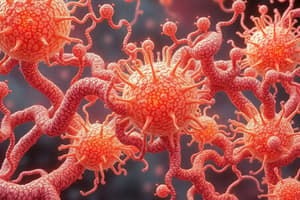Podcast
Questions and Answers
The circulatory system is the only system responsible for transporting materials in the body.?
The circulatory system is the only system responsible for transporting materials in the body.?
False (B)
Blood is a transport medium for both dissolved and suspended materials?
Blood is a transport medium for both dissolved and suspended materials?
True (A)
The circulatory system primarily consists of the heart and the blood vessels?
The circulatory system primarily consists of the heart and the blood vessels?
True (A)
The circulatory system is responsible for regulating cardiac output and blood pressure?
The circulatory system is responsible for regulating cardiac output and blood pressure?
Blood composition does not include cellular constituents?
Blood composition does not include cellular constituents?
Blood vessels are a complex network of conduits through which blood is carried from the heart to all parts of the body and back to the heart.
Blood vessels are a complex network of conduits through which blood is carried from the heart to all parts of the body and back to the heart.
The circulatory system also serves the function of transporting nutrients, electrolytes, hormones, and metabolic wastes in the body.
The circulatory system also serves the function of transporting nutrients, electrolytes, hormones, and metabolic wastes in the body.
The circulatory system does not play a role in regulating the body's internal environment, such as pH and electrolyte balance.
The circulatory system does not play a role in regulating the body's internal environment, such as pH and electrolyte balance.
Blood constitutes approximately 10% of body weight.
Blood constitutes approximately 10% of body weight.
Plasma consists of around 92% water and 7% dissolved solutes and specialized proteins.
Plasma consists of around 92% water and 7% dissolved solutes and specialized proteins.
Red blood cells, white blood cells, and platelets are the formed elements suspended in liquid plasma.
Red blood cells, white blood cells, and platelets are the formed elements suspended in liquid plasma.
The heart does not serve as a pump that generates the cardiac output & pressure gradient needed for blood to flow to organs & tissues.
The heart does not serve as a pump that generates the cardiac output & pressure gradient needed for blood to flow to organs & tissues.
Blood does not carry leukocytes, cytokines, and complement that act to protect against invading pathogens.
Blood does not carry leukocytes, cytokines, and complement that act to protect against invading pathogens.
The circulatory system does not help in diverting blood to cool or warm the body for temperature regulation.
The circulatory system does not help in diverting blood to cool or warm the body for temperature regulation.
O2 and CO2 are not transported by the circulatory system.
O2 and CO2 are not transported by the circulatory system.
Which of the following is NOT a function of the circulatory system?
Which of the following is NOT a function of the circulatory system?
What percentage of the body weight does blood constitute?
What percentage of the body weight does blood constitute?
What is the primary function of platelets in the circulatory system?
What is the primary function of platelets in the circulatory system?
What is the approximate total volume of blood in males?
What is the approximate total volume of blood in males?
Which component constitutes the majority of plasma?
Which component constitutes the majority of plasma?
What are the formed elements suspended in liquid plasma?
What are the formed elements suspended in liquid plasma?
What does the circulatory system primarily transport for excretion?
What does the circulatory system primarily transport for excretion?
What is the main function of leukocytes in the circulatory system?
What is the main function of leukocytes in the circulatory system?
Which organ do metabolic wastes get transported to for excretion by the circulatory system?
Which organ do metabolic wastes get transported to for excretion by the circulatory system?
What is the primary function of the heart in the circulatory system?
What is the primary function of the heart in the circulatory system?
What is the primary function of the circulatory system?
What is the primary function of the circulatory system?
Which of the following is a formed element suspended in liquid plasma?
Which of the following is a formed element suspended in liquid plasma?
What is the major composition of plasma?
What is the major composition of plasma?
What is the main function of leukocytes in the circulatory system?
What is the main function of leukocytes in the circulatory system?
What is the characteristic function of the heart in the circulatory system?
What is the characteristic function of the heart in the circulatory system?
Which component of the circulatory system is responsible for carrying oxygen and carbon dioxide?
Which component of the circulatory system is responsible for carrying oxygen and carbon dioxide?
What is the primary role of blood vessels in the circulatory system?
What is the primary role of blood vessels in the circulatory system?
Which statement best describes the composition of blood?
Which statement best describes the composition of blood?
What is the primary function of the vascular system in the circulatory system?
What is the primary function of the vascular system in the circulatory system?
What is the primary function of plasma in the circulatory system?
What is the primary function of plasma in the circulatory system?
What is the approximate total volume of blood in females?
What is the approximate total volume of blood in females?
Which component constitutes the majority of plasma in blood?
Which component constitutes the majority of plasma in blood?
What is the primary function of leukocytes in the circulatory system?
What is the primary function of leukocytes in the circulatory system?
Which organ do metabolic wastes get transported to for excretion by the circulatory system?
Which organ do metabolic wastes get transported to for excretion by the circulatory system?
What percentage of the body weight does blood constitute?
What percentage of the body weight does blood constitute?
What is the main function of platelets in the circulatory system?
What is the main function of platelets in the circulatory system?
Which statement best describes the composition of blood?
Which statement best describes the composition of blood?
Blood vessels are responsible for which function in the circulatory system?
Blood vessels are responsible for which function in the circulatory system?
Which of the following is NOT a function of the circulatory system?
Which of the following is NOT a function of the circulatory system?
What is the characteristic function of the heart in the circulatory system?
What is the characteristic function of the heart in the circulatory system?
What is the main function of leukocytes in the circulatory system?
What is the main function of leukocytes in the circulatory system?
What is the primary function of plasma in the circulatory system?
What is the primary function of plasma in the circulatory system?
What organ do metabolic wastes get transported to for excretion by the circulatory system?
What organ do metabolic wastes get transported to for excretion by the circulatory system?
What is the characteristic function of the heart in the circulatory system?
What is the characteristic function of the heart in the circulatory system?
What is the major composition of plasma?
What is the major composition of plasma?
Which component constitutes the majority of plasma?
Which component constitutes the majority of plasma?
What is the approximate total volume of blood in males?
What is the approximate total volume of blood in males?
What is the primary role of blood vessels in the circulatory system?
What is the primary role of blood vessels in the circulatory system?
What is the primary function of the circulatory system?
What is the primary function of the circulatory system?
Describe the major components of the circulatory system.
Describe the major components of the circulatory system.
What is the composition of blood and the main functions of its solute & cellular constituents?
What is the composition of blood and the main functions of its solute & cellular constituents?
Describe the location & gross anatomy of the heart.
Describe the location & gross anatomy of the heart.
Describe the cardiac cell types & their characteristic properties & functions, and the cardiac cycle.
Describe the cardiac cell types & their characteristic properties & functions, and the cardiac cycle.
Describe the structure & function of the various segments of the blood vessel or vascular system.
Describe the structure & function of the various segments of the blood vessel or vascular system.
Give an account of the mechanisms involved in the regulation of cardiac output & blood pressure.
Give an account of the mechanisms involved in the regulation of cardiac output & blood pressure.
What are the functions of the circulatory system?
What are the functions of the circulatory system?
What are the components of blood?
What are the components of blood?
What is the approximate total volume of blood in males?
What is the approximate total volume of blood in males?
What percentage of the body weight does blood constitute?
What percentage of the body weight does blood constitute?
What are the primary functions of plasma in the circulatory system?
What are the primary functions of plasma in the circulatory system?
What is the characteristic function of the heart in the circulatory system?
What is the characteristic function of the heart in the circulatory system?
What role do leukocytes play in the circulatory system?
What role do leukocytes play in the circulatory system?
What is the primary function of platelets in the circulatory system?
What is the primary function of platelets in the circulatory system?
What is the primary role of blood vessels in the circulatory system?
What is the primary role of blood vessels in the circulatory system?
What are the components of formed elements in blood?
What are the components of formed elements in blood?
Flashcards are hidden until you start studying
Study Notes
Circulatory System Overview
- The circulatory system is responsible for transporting materials in the body.
- It consists of the heart and blood vessels.
Blood Composition
- Blood constitutes approximately 10% of body weight.
- Plasma makes up around 92% of blood, consisting of water (92%) and dissolved solutes and specialized proteins (7%).
- Formed elements suspended in plasma include red blood cells, white blood cells, and platelets.
Functions of the Circulatory System
- Transports nutrients, electrolytes, hormones, and metabolic wastes in the body.
- Regulates cardiac output and blood pressure.
- Plays a role in regulating the body's internal environment, such as pH and electrolyte balance.
Heart Function
- The heart serves as a pump that generates the cardiac output and pressure gradient needed for blood to flow to organs and tissues.
Platelet Function
- The primary function of platelets is to facilitate blood clotting.
Leukocyte Function
- Leukocytes play a role in protecting against invading pathogens.
Blood Vessel Function
- Blood vessels form a complex network of conduits through which blood is carried from the heart to all parts of the body and back to the heart.
Oxygen and Carbon Dioxide Transport
- The circulatory system transports oxygen and carbon dioxide.
Waste Removal
- Metabolic wastes get transported to the kidneys for excretion by the circulatory system.
Primary Function of the Circulatory System
- The primary function of the circulatory system is to transport materials in the body.
Studying That Suits You
Use AI to generate personalized quizzes and flashcards to suit your learning preferences.





